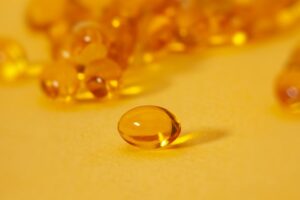Vitamin D may not prevent COVID-19
Vitamin D may not prevent COVID-19
Vitamin D may not prevent COVID-19. Reference News reported on November 4 The American Fun Science website published on November 2 the title “Can Vitamin D Prevent New Coronavirus?” According to the report, recent studies have found an association between low vitamin D levels and an increased risk of contracting COVID-19 pneumonia, but it has not proven that this vitamin has a protective effect. The full text is excerpted as follows:
In the absence of COVID-19 pneumonia treatments or vaccines, scientists are studying whether vitamin D can reduce the risk of contracting COVID-19 pneumonia or reduce the severity of the disease. Indeed, the idea of taking vitamins to prevent COVID-19 pneumonia is quite tempting.
A study published on September 3 in the Journal of the American Medical Association · Open Network found that people who lack vitamin D are at almost twice the risk of contracting COVID-19 pneumonia as those with adequate vitamin D levels. Another study published on October 27 in the monthly issue of the Journal of Clinical Endocrinology and Metabolism found that inpatients with COVID-19 pneumonia were more deficient in vitamin D than the control group, who did not contract COVID-19 pneumonia, but their vitamin D levels It was measured before the outbreak.
Adrian Martino, who studies respiratory infections and immunity at Queen Mary University of London, said these associations do not prove that vitamin D deficiency increases the risk of contracting COVID-19 pneumonia. “But this can explain some problems, enough to prove the need for further research to find out whether there is a real causal relationship.” Martino did not participate in the two studies.
He said that there are several reasons to speculate that vitamin D can reduce the risk of contracting COVID-19 pneumonia. Studies have shown that vitamin D can enhance the immune system’s response to the virus and suppress the immune system’s inflammatory response; and excessive inflammation is a feature of severe cases of COVID-19 pneumonia.
According to Martino’s meta-analysis, compared with placebo, vitamin D supplementation can reduce the risk of acute respiratory infections overall. This meta-analysis was originally published in the British Medical Journal weekly in 2017, and it was updated in July this year. The newer research was published on the preprint server medical paper archive online.
In addition, Martino said there is overlap between people who are more likely to be vitamin D deficient (such as the elderly and people with darker skin) and people who are more likely to contract COVID-19. “People see these facts and think, well, such a coincidence is too amazing, if it is a coincidence.”
A study published in the journal “Clinical and Experimental Research on Aging” on May 6 found that among 20 European countries, the lower the average vitamin D level, the higher the infection rate and mortality rate of COVID-19 pneumonia.
However, not all studies have shown that vitamin D has a protective effect. A study published in the journal Diabetes and Metabolic Syndrome on May 7 found that once researchers consider other factors that may affect the risk of COVID-19 infection, there is no relationship between vitamin D levels and the risk of COVID-19 infection. Statistically related.
Dr. David Meltzer, a researcher from the University of Chicago, said of his and other people’s research on the association between vitamin D and the risk of COVID-19 pneumonia infection, said: “None of these can prove that vitamin D deficiency leads to COVID-19 pneumonia. It may be the original body People who are not good are more likely to be deficient in vitamin D.”
In order to answer the question of whether to lay eggs or lay chickens, Martino is leading a study in which participants take different doses of vitamin D at random, and then follow up to determine whether taking more vitamin D can reduce the risk of COVID-19 pneumonia infection Or severity. (Compilation / Qing Songzhu)
[Extended reading] Foreign media: Will lack of vitamin D lead to aggravation of COVID-19 pneumonia?
Reference News Network reported on October 28. Foreign media said that a Spanish study showed that vitamin D deficiency may be a common cause of hospitalization for patients with severe COVID-19 pneumonia.
The Economic News Net of Buenos Aires, Argentina reported on October 27 that the latest study was published in the monthly American Journal of Clinical Endocrinology and Metabolism on October 27. The study also pointed out that 80% of patients with COVID-19 pneumonia in a Spanish hospital lack vitamin D.
The results of the study show that identifying and paying attention to patients with COVID-19 pneumonia who lack vitamin D, especially the elderly and other patients who are at higher risk of severe COVID-19 pneumonia, are likely to help improve the treatment effect of COVID-19 pneumonia.
According to the report, in order to launch this study, the researchers compared the vitamin D levels of a total of 216 patients with COVID-19 pneumonia in a Spanish hospital with the levels of 197 healthy people with similar demographic characteristics such as age and gender. The study authors also analyzed whether the severity of the hospitalized patients’ condition is related to their vitamin D levels.
Researchers found that excluding those patients with COVID-19 pneumonia who took vitamin D supplements, 82.2% of patients with COVID-19 pneumonia lacked vitamin D, while only 47.2% of the control group lacked vitamin D. Generally speaking, male patients with COVID-19 pneumonia have lower vitamin D levels than female patients.
The report also said that Jose L. Hernández, a professor at the University of Cantabria in Spain and a collaborator of the study, said that the results of the study indicate that vitamin D supplementation should be used as a COVID-19 for low vitamin D levels in the blood. One of the treatments for patients with pneumonia, because this therapy may have benefits for both the musculoskeletal and immune system.
Researchers also found that patients with COVID-19 pneumonia with lower vitamin D levels are more likely to develop high blood pressure and heart disease, have higher inflammation indicators and have longer hospital stays.
The report pointed out that it is worth mentioning that the researchers found that there is no direct connection between vitamin D deficiency and the severity of COVID-19 pneumonia. There was no significant increase in the occupancy rate, ventilator use rate, and mortality rate of patients with low vitamin D levels.
The report finally stated that it is also worth noting that the treatment effect of the 19 patients with COVID-19 pneumonia who took vitamin D supplements was even slightly worse than those who did not take them, such as the higher occupancy rate of the intensive care unit. However, this phenomenon occurs at least in part because patients who need more vitamin D supplements, such as the elderly at risk of fractures, are also patients at high risk of severe COVID-19 pneumonia.
(source:internet)



